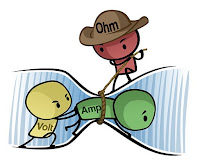redupoint
Resistance
All About Electric Resistance
At this page, we have a tendency to fully outline resistance & every important data regarding resistance
INDEX
- resistance or resistance is a constant term
- factors upon which resistance depends
- resistivity
- temperature coefficient of resistance
- combination of resistance (SCR&PCR)
RESISTANCE
Electric Resistance is a property of a resistor to oppose the flow of electric current through it.
OR
The flow of free electrons is called current, and resistance is the obstruction in the path of flow of electron.
NOTE: Conductors (metals) have very little resistance while insulators (glass rubber, mica, etc.) have a large amount of resistance.
Resistance is a constant term, that present where the flow of charge takes place
Mathematically,
V ∝ I
On removing proportionality sign (as a constant resistance comes),
On removing proportionality sign (as a constant resistance comes),
V = IR
Where,
v= volt,
I= current,
R= resistance (as a constant term)
v= volt,
I= current,
R= resistance (as a constant term)
Resistance can be denoted by (R or r)
The SI unit of resistance is ohm ( Ω).
If the potential difference (V) is 1 volt and current (I) is 1 ampere, then the Resistance (R) is 1 ohm
If the potential difference (V) is 1 volt and current (I) is 1 ampere, then the Resistance (R) is 1 ohm
Resistance can be found by the "BBROYGBVGW" method.
Very high resistance is measured in mega-ohm and very low resistance in micro-ohm.
S.No.
|
Prefix
|
Symbol
|
Value in ohm (℧)
|
1.
|
Micro i.e. one millionth
|
10-6
| |
2.
|
Milli i.e. one thousandth
|
10-3
| |
3.
|
Kilo i.e. one thousand
|
103
| |
4.
|
Mega i.e. one million
|
106
|
Factors upon which resistance depends:
- Length: The resistance R of a conductor is directly proportional to its length i.e. R directly proportional L
R ∝ L
i.e., an increase in the length of a conductor increases its resistance and vice versa.
- Area of cross-section: The resistance R of a uniform conductor is inversely proportional to its area of cross-section (A),
i.e., if we increase the cross-sectional area (A) of the conductor, it's resistance decreases and vice-versa.
- Nature of material: The resistance of a material conductor also depends on the nature of its material. In a simple word, a material having a large number of free electron, lesser is the electric resistance.
For e.g. the resistance of nichrome wire is 60 times that of copper wire and of equal length of the cross-section area.
- Changes with temperature: i.e., resistance increase with the increase in temperature
Neglecting the effect of temperature, for the time being, the electrical resistance of a conductor
by combining both equations (1)&(2)
Where rho (ρ) is a constant and known as electrical resistivity or specific resistance of a conductor.
Resistivity:
The electrical resistivity of the material of a conductor is defined as the resistance of unit length and the unit cross-section area of the conductor.
The SI unit of resistivity is Ohm.
Electrical resistivity depends on the nature of material and relaxation time.
Effect of temperature on resistance:
The effect of temperature on resistance depends upon the type of material
- The resistance increases with increase in temperature (for metals)
- The resistance increase rise in temperature but he increases is very small or irregular (for alloy)
- The resistance of semiconductors (Ge & Si), insulators (.e.g., glass, paper, mica, etc) and electrolytes decrease with an increase in temperature
Temperature coefficient of Resistance:
· At 't' deg. C resistance increase to Rt
· So increment in resistance is:
Rt - Ro
Rt - Ro
This increment in resistance depends on
·
Initial resistance of conductor (Ro)
Initial resistance of conductor (Ro)
· Rt - Ro ∝ Ro
· (Rt - Ro) ∝ t
· On the nature of the material
So (Rt - Ro) ∝ Rot
here, ∝ sign denotes proportional
here, ∝ sign denotes proportional
On removing proportionality sign, a constant come (∝)
(Rt - Ro) = ∝Rot
here, ∝ (alpha) is temperature co-efficient of resistance
here, Rt is the value of resistance at any to temperature
Combination of Resistance
There are two types of combination of Resistance
- · Series combination of Resistance
- · Parallel combination of Resistance
- Series combination of Resistance
·
-Sum of potential difference across individual Resistor is equal to the potential difference applied by source,
V = V1+V2+V3
·
-Equivalent Resistance,
-Equivalent Resistance,
R = R1+R2+R3 ...
(1)
·
-By Ohm’s law
-By Ohm’s law
V1 = IR1 V2
= IR2 V3
= IR3
Total potential difference (V) between A&B
From equation (1) we know that, R= R1+R2+R3
- Parallel combination of Resistance:
·
-Sum of electric current flowing through the individual resistor is equal to electric current drawn by the source,
-Sum of electric current flowing through the individual resistor is equal to electric current drawn by the source,
I=I1+I2+I3
So, the total current:
Thank you! if you've got any question associated with resistance please comment or for additional topics comment, please
































0 coment�rios:
It's all about friendly conversation, Therefore don't be shy while commenting any question, doubt or any idea related to my post.
I'd love to see your comments and thoughts,
Be sure to check back again because, I do make every effort to reply to your comment here.